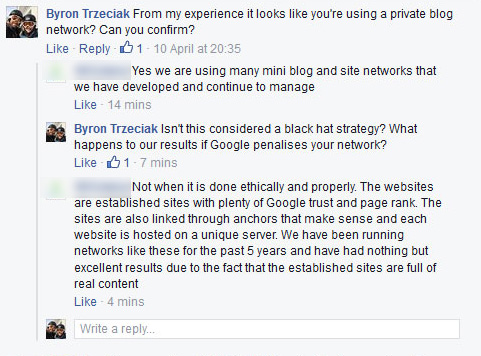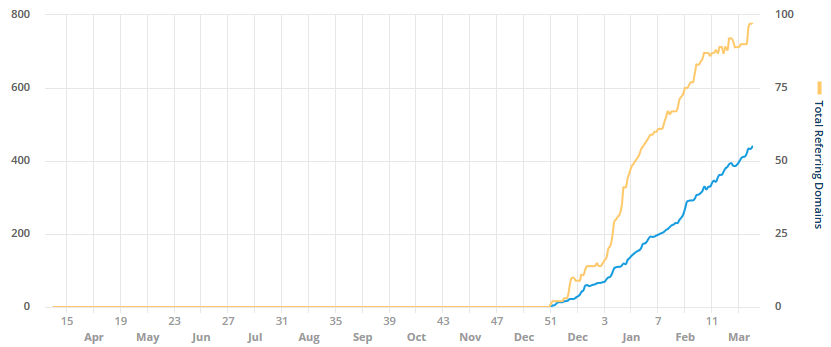For some time now I’ve seen a trend with SEO companies providing “guarantees” for the SEO services they provide, I’ve even thought about offering it myself. Why not? It’s great for marketing and even better security for the client? Not to mention that guarantees are becoming even more important to customers due to SEO fatigue and that client’s have been burnt from prior negative SEO experiences.
Once bitten twice shy.
The question you should ask yourself however is whether or not its possible to offer a guarantee in a system completely controlled by Google? I’d like to think that I have a magic wand or a process to instant results but alas, I don’t and neither does any other SEO. So how can it be that some SEO agencies can offer guarantee while others simply shy away?
It’s important to first understand Google’s stance:
No one can guarantee a #1 ranking on Google.
Beware of SEOs that claim to guarantee rankings, allege a “special relationship” with Google, or advertise a “priority submit” to Google. There is no priority submit for Google.
It’s common knowledge that Google likes to throw curve balls by attempting to tell us how they want it to work versus how it actually works but guarantees aren’t one of those. At the end of the day the only “thing” that controls Google is Google, don’t they know it.
Why SEO Guarantees Can’t Be Trusted
It’s amazing that as far back as 2008 experts in the industry such as Moz were already talking about guarantees in the SEO industry and why reputable firms simply won’t offer it. Yet here we are in 2015 and it’s still a topic for debate as it’s simply a marketing and sales technique to strong to ignore for many agencies.
So let’s talk about why an SEO agency might be able to offer guarantees versus one that can’t and how the ones that do can control their success while hiding guarantees in the small print.
Private Blog Networks (PBNs)
Private blog networks (PBN) is an unsanctioned method for building backlinks for a specific website to boost the rank in search engines. Google consider this technique as a Black Hat SEO technique. – Wikipedia
Search engine Journal explains it well in their article the Private Network Purge
Private blog networks are basically a method SEO agencies are using for building a network of high authority websites that are in their complete control. By having complete control of these networks that can simply add articles and links across this network using a variety of your target keyword terms and phrases and rapidly boost the ranking of your site.
As much as Google likes to say that “Content is king” I can tell you that in a competitive industry links matter and a combination of the two is killer. Often links yield far better results and in less time and money when compared to competing in the content game. Great content will do nothing unless you have a network of influencers to distribute and promote that article for you.
The thing with Private Blog Networks is that most agencies that use one simply won’t tell you that they are, it’s taboo. Google has already targeted PBNs recently de-indexing a number of the biggests and devaluing all of their links and therefore containing the secret that you are using one is paramount to its long-term success.
So do PBNs work? Unfortunately they do and while Google has improved in their detection techniques they will always exist. Here’s a discussion that I had on Facebook with an SEO business advertising in my feed.

As you can see from the above example they offer three excuses:
- The websites are established with plenty of Google trust and page rank – i.e. they purchased domain names that were previously used and had existing domain authority.
- The sites are linked through anchors that make sense – i.e. they’re trying to make their unnatural network appear natural
- Each website is hosted on a unique server – i.e. Google doesn’t trust many links coming from the same server so PBN owners try to hide their network across many different servers. They are again attempting to make it look natural.
At the end of the day while PBNs can provide short-term and fast results businesses and PBN owners should expect that at some stage these links may be found. The last thing you want as a customer is to wake up one day to find that your #1 ranking is now on page #5 or even worse, it’s been deleted from Google. If you’re an agency using a PBN and these results are amplified against many customers then you’re in troubled water.
Negative SEO & Automated Link Building
Last week we touched on Negative SEO and how it can affect your website. This article was discussed in the tone of someone such as competitor attempting to negatively affect your site in search engines. In this article however I’m talking more about SEO agencies and how they’re using automated link building techniques to mass produce links to your website on the exact keyword (anchor text) you’d like to rank for.
Ever received an email from someone saying they couldn’t find your website in Google yet somehow they managed to leave a comment on your blog? That’s the kind of service you can expect from these kind of enquiries.
Google Penguin was a Google algorithm update i.e. a type of penalty, announced in April, 2012 which was aimed at decreasing the number of websites in violation of Googles policies. It was later seen as a penalty applied for those involved in artificially increasing the ranking of a website by manipulating the number of links its receiving. In simple terms using automated and spammy link building techniques was going to put you in the naughty book.
Automated link building techniques are easy to see just by creating a graph of time vs number of links / domains.

As you can see in the above example in December the number of inbound links to this website spiked significantly from 0 to over 100 referring domains. In a natural word it’s unlikely this will happen. Although not impossible for global brand or amazing ‘viral’ content but to a sub standard website, shitty content or most local businesses this would seem very abnormal.
Can this type of link building garner results? Absolutely but usually only for a fixed period of time. Google doesn’t apply their penalty algorithms every day which means that it’s simply about putting their fishing net into the water and after a period of time pulling it out and seeing how many businesses they’ve caught. Don’t let yours be one of them.
Keywords & Low Competition
Finally the most common way for agencies to offer guarantees is to guarantee a certain number of low competition keywords. Rand Fishkin from Moz explains it well
Many of the SEO companies that do still guarantee rankings have taken the clever tack of guaranteeing a certain number of keywords that they themselves choose. In this fashion, they can select primarily non-competitive terms and have a fairly high rate of success. Whether those keyword rankings provide any serious traffic is another matter altogether.
Basically they’re offering keywords that are worthless and incredibly simple to rank for and providing the customer with a false sense of hope that they’ll rank #1 for all of their primary keywords. This form of guarantee in my eyes is likely the least damaging however at the end of the day can still end up in significant costs for the client without any results delivered.
It’s Not Rankings You Want, Think Conversions
This is something that myself and other agencies have been trying to promote and educate within the industry. In most cases it’s not rankings but the conversions, i.e. sales, you want from your website and the SEO agency you engage with. At the end of the day it’s the conversions that are going to provide you with the return and not necessarily the ranking.
It’s no secret that the majority of clicks that Google receives are in the top three so it makes sense that you want your website to be in that top three, I get that. The ranking itself won’t guarantee increased sales, that’s something that will come down to your ability to convert the traffic with your website.
Let’s talk about some of the reasons why ranking isn’t a great metric to determine the success of an SEO campaign and why it makes little sense to put all of your SEO “eggs” into the one basket.
Regions & Location Based SEO
What we’re seeing these days with the introduction of Google My Business is the ability to provide Google with your exact business location. Signing up to Google allows you to put your business address into Google and Google then sends you a code to verify that you are in fact in that location.
With Google searches it’s possible for Google to predict where your search is coming from, i.e. Melbourne in my case, or you can even tell them exactly where you’re searching from by scrolling to the bottom of the search results and using the Use precise location option.
Now Google knows two things:
- Your location
- Businesses location
So Google’s ability to provide the most relevant search results becomes that little bit easier. Let’s say you’re searching for a “plumber”, if Google knows you’re in Melbourne and Joe Bloggs Plumbing is in Melbourne too then it makes sense to show their website higher in search results. In the future this means that for competitive search terms such as “web design” it will likely show local businesses relevant to the searchers location rather than the website with the most expensive marketing budget.
Keyword Competition
Most of the time client’s focus on high competition (fat head) keywords and forget about all of the value in low competition keywords (long tail). Moz describes this well in their article on keywords.
The graph (to the right) shows that %70 of the total number of searches are long tail keywords so why do we spend all our time focusing high competition keywords that make up for only 18.5% of the total number of searches. Instead we should focus on a combination of the two:
- Fat head – Long term mindset
- Long Tail – Short term mindset
If we can rank #1 for 10 long tail keywords that each provide 10 visitors per day then that’s 100 visitors per day we can gain for a much smaller effort. Attempting to rank for fat head keywords might take far longer and if you don’t make it to the top 3 results you might find that it does little to affect your traffic.
Rank Volatility
Rankings are inherently unstable. Just the other day I did a search on three different mobile phones and received three different sets of search results. Results are becoming more and more tailored to the person that is searching rather than providing consistent search results for everybody.
- Location
- Type of device i.e. mobile vs desktop
- Signed in vs Signed out
- Keyword variations i.e. cakes Melbourne vs cake shop Melbourne
- Whether you’ve clicked the link before
Not only are the results determined by a wide variety of factors but on any day consider signficant movement. Until you reach the higher search results expect your site and your keywords to move around considerably as your build authority and trust to your domain name.
You Can’t Control but You Can Influence
The game is not appearing to be natural, it’s to be natural.
So at the end of the day any reputable organisation will shy away from guarantees and in most cases they’ll also try to educate you on the importance of conversions rather than rankings. In saying that however the mindset should not be to control but to influence search engines by doing all the right things. A reputable SEO agency will have an SEO process designed to influence search results which has been built using Google best practice and proven experience of gaining results.
The balance between what Google tells us and the experience of knowing what works is a fine line and it’s important for all involved in SEO that we work towards sustainable results, versus churn and burn, in order to continue to maintain a reputable and trusted industry.


